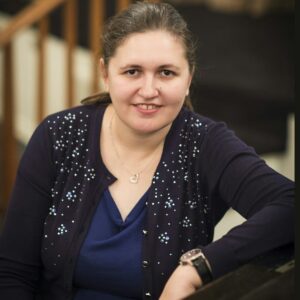
Russian-American pianist Regina Shenderovich received her early training at the Special Music School of the St. Petersburg Conservatory in Russia. She holds her Bachelor of Music degree from the Boston Conservatory where she studied with Michael Lewin and Master of Music degree from the Peabody Conservatory of Johns Hopkins University where she studied with Leon Fleisher.
A winner of numerous awards, she has won prizes in piano competitions and performed internationally as a solo recitalist and in chamber and orchestral concerts. Ms. Shenderovich has also been featured in film and television programs and documentaries. She has taught students of different ages, was a faculty member at the Settlement Music School in Philadelphia, the Main Line Music Academy in Ardmore PA and was a graduate teaching assistant at the University of Illinois at Urbana-Champaign.
Regina Shenderovich earned her Doctor of Musical Arts degree from the UIUC, where she studied with Professor Ian Hobson.
"I feel very fortunate to have studied in both countries. It was great learning about different approaches to music."
Can you tell us about your musical background? For instance, do you come from a musical family?
My mother was a musician. She had a beautiful soprano voice and she also played piano. She really loved music and wanted me to play piano. I started my musical studies at the age of five.
Are there any individuals who have influenced you musically?
I was fortunate to have studied with many wonderful musicians. I received my early training at the Special Music School of St. Petersburg Conservatory in Russia as student of Lubov Rudova. When I emigrated to the United States I studied with an American pianist, Michael Lewin at the Boston Conservatory where I earned my Bachelor of Music degree. I earned my Master of Music degree from the Peabody Conservatory as a student of renowned pianist and conductor Leon Fleisher. With him I delved deep into some of the musical masterpieces in the piano repertoire such as Diabelli Variations, late Beethoven and Schubert Sonatas, Brahms Concertos. Leon Fleisher was a student of the legendary pianist Artur Schnabel. It was a privilege to be chosen to participate in the Oscar-nominated short documentary “Two Hands: The Leon Fleisher Story”. I earned my Doctor of Musical Arts degree from the University of Illinois at Urbana-Champaign, where I studied with professor Ian Hobson. I have also participated in numerous masterclasses and summer festivals where I studied with such musicians as Vladimir Feltsman, Sergei Babayan, Margarita Fyodorova, Jerome Lowenthal, Martin Canin, Jerome Rose, Bernd Glemser.
Who are some pianists whom you admire?
There are so many great players whom I respect and admire. I really like Sviatoslav Richter, Murray Perahia, Alfred Brendel, Alicia de Larrocha, just to name a few.
Since you were trained in Russia before coming to the States, do you notice any differences between the training in Russia as opposed to the States? What are some differences if any?
In Russia there was more emphasis on Russian music because it is such a big part of the culture. Also I used to have my piano lesson twice per week where in the US it is once per week. I feel very fortunate to have studied in both countries. It was great learning about different approaches to music. In my biography I write that I am a Russian-American pianist because I spent half of my life in Russia and the other half in the US.
Can you tell us about the upcoming recital that you will be performing at Carnegie Hall on October 30?
I will be playing Mendelssohn’s Prelude and Fugue in E minor, op 35. No. 1 and J. S Bach’s The Art Of Fugue BWV 1080. Mendelssohn’s Prelude and Fugue in E minor is about eight minutes long. Mendelssohn was a great admirer of Bach and played a very important role in reviving his music. However, this Prelude and Fugue is not an imitation of Bach. In the Prelude he uses a three-hand technique made popular by Thalberg. It is important to point out that originally Mendelssohn intended to compose Etudes and Fugues. His E minor Fugue was not inspired by Bach, but by illness and death of his friend August Hanstein. Mendelssohn’s debt to Bach lies in the choice of genre but he manages to find a romantic voice for the fugue. The fugue ends with Choral in E major. J. S. Bach’s The Art Of Fugue, which takes about eighty minutes to perform is a contrapuntal masterpiece which consists of 14 contrapuncti and 4 canons. It was written in open score. I firmly believe it is intended to be performed on a keyboard instrument. The contrapunctus 14 was left unfinished because Bach died. I will be playing Bach’s Chorale “Ver deinen Thron tret ich hiermit” BWV 668a as suggested by Bach’s son CPE Bach, who inserted it when preparing the first edition of The Art of Fugue.
Regina Shenderovich performs on Tuesday, October 30, 2018 at Weill Recital Hall at Carnegie Hall. For tickets, click here.

